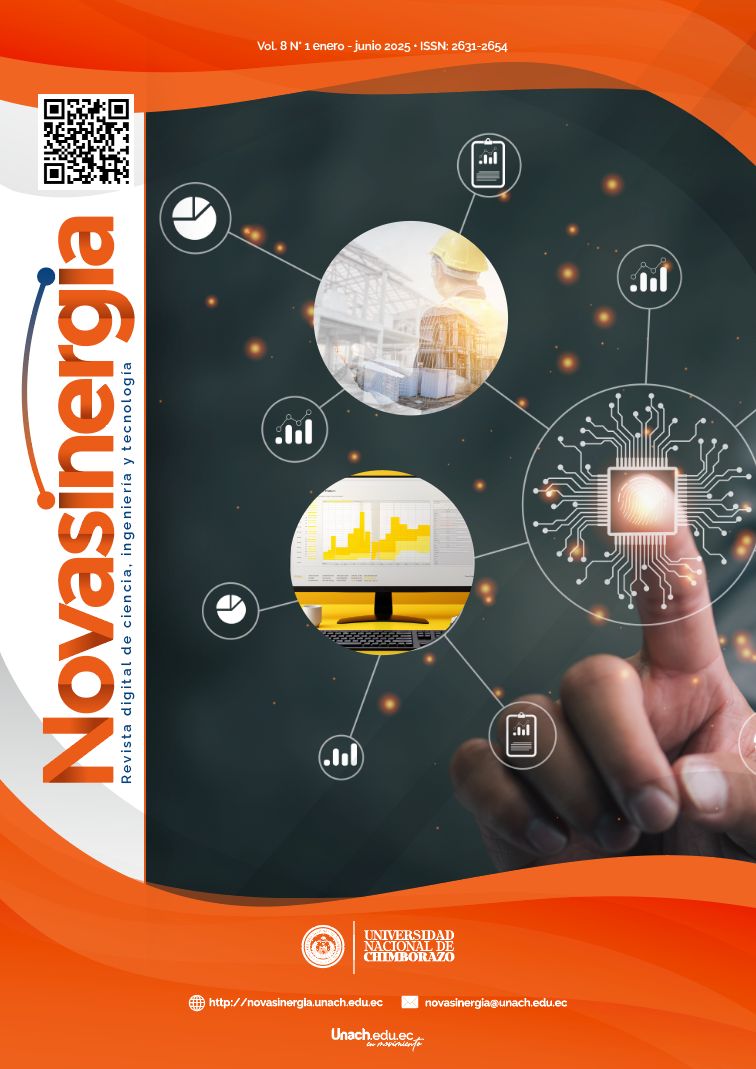Impacto de modelos de lenguaje de gran tamaño en calidad y eficiencia de generación de código: Revisión Sistemática de Literatura
DOI:
https://doi.org/10.37135/ns.01.15.10Palabras clave:
Editores de código, generación de cógido, metodología de revisisón, modelos de lenguaje de gran tamaño, revisión sistemática de literaturaResumen
Los Modelos de Lenguaje de Gran Tamaño (LLM) están revolucionando la eficiencia y automatización en la generación de código de programación. Este trabajo tiene como objetivo proporcionar una visión general del estado del arte de estos modelos y su aplicación específica en la programación. La metodología permitió identificar 549 publicaciones iniciales, cribadas en fases sucesivas hasta seleccionar 27 artículos clave para el análisis cualitativo. Los resultados muestran que los LLM mejoran significativamente la calidad del código generado, optimizan la productividad de los programadores y apoyan el aprendizaje mediante herramientas como ChatGPT, Codex y GitHub Copilot. El análisis destaca que el 66,7% de los artículos revisados se publicaron en el 2024, reflejando el creciente interés en este campo. Estados Unidos lidera la investigación con 11 publicaciones, seguido de Países Bajos y Suiza. Los estudios seleccionados se filtraron para generar una síntesis crítica que evalúa la calidad y aplicabilidad de los LLM en la escritura y depuración de código. Esta revisión analiza las principales ventajas de los LLM, como la mejora en la productividad y la generación de código optimizado. Sin embargo, también aborda desafíos como la precisión y el riesgo de errores o código no seguro. Los LLM pueden mejorar significativamente la calidad del código generado. También pueden facilitar la curva de aprendizaje de los nuevos programadores. No obstante, se resalta la necesidad de mantener una supervisión humana rigurosa para garantizar la fiabilidad de las soluciones generadas por los modelos.
Descargas
Referencias
Bae, J., Kwon, S., & Myeong, S. (2024). Enhancing Software Code Vulnerability Detection Using GPT-4o and Claude-3.5 Sonnet: A Study on Prompt Engineering Techniques. Electronics, 13(13), 2657. https://doi.org/10.3390/electronics13132657
Bender, E. M, Gebru T., McMillan-Major A., Shmitchell S. (2021). On the Dangers of Stochastic Parrots: Can Language Models Be Too Big?. In Proceedings of the 2021 ACM Conference on Fairness, Accountability, and Transparency (FAccT '21). Association for Computing Machinery, New York, NY, USA, 610–623. https://doi.org/10.1145/3442188.3445922
Chen, M., Tworek, J., Jun, H., Yuan, Q., Pinto, H. P. de O., Kaplan, J., Edwards, H., Burda, Y., Joseph, N., Brockman, G., Ray, A., Puri, R., Krueger, G., Petrov, M., Khlaaf, H., Sastry, G., Mishkin, P., Chan, B., Gray, S., … Zaremba, W. (2021). Evaluating Large Language Models Trained on Code. arXiv Computer Science. https://doi.org/10.48550/arXiv.2107.03374
De Fitero-Dominguez, D., Garcia-Lopez, E., Garcia-Cabot, A., & Martinez-Herraiz, J.-J. (2024). Enhanced automated code vulnerability repair using large language models. Engineering Applications of Artificial Intelligence, 138. https://doi.org/10.1016/j.engappai.2024.109291
Foster, M. J., & Jewell, S. T. (2017). Assembling the pieces of a systematic review: A guide for librarians. Rowman & Littlefield Publishers.
Fritsch, R. F., & Jatowt, A. (2024). LLMTemporalComparator: A Tool for Analysing Differences in Temporal Adaptations of Large Language Models. arXiv Computer Science. https://doi.org/10.48550/arXiv.2410.04195
Haddaway, N. R., Page, M. J., Pritchard, C. C., & McGuinness, L. A. (2022). PRISMA2020: An R package and Shiny app for producing PRISMA 2020-compliant flow diagrams, with interactivity for optimised digital transparency and Open Synthesis. Campbell Systematic Reviews, 18(2), e1230. https://doi.org/10.1002/cl2.1230
Haindl, P., & Weinberger, G. (2024). Students’ Experiences of Using ChatGPT in an Undergraduate Programming Course. IEEE Access, 12, 43519-43529. https://doi.org/10.1109/ACCESS.2024.3380909
Harzing, A.W. (2007). Publish or Perish. https://harzing.com/resources/publish-or-perish
Jošt, G., Taneski, V., & Karakatič, S. (2024). The Impact of Large Language Models on Programming Education and Student Learning Outcomes. Applied Sciences, 14(10), 4115. https://doi.org/10.3390/app14104115
Kau, A., He, X., Nambissan, A., Astudillo, A., Yin, H., & Aryani, A. (2024). Combining Knowledge Graphs and Large Language Models. arXiv Computer Science. https://doi.org/10.48550/arXiv.2407.06564
Kazemitabaar, M., Chow, J., Ma, C. K. T., Ericson, B. J., Weintrop, D., & Grossman, T. (2023). Studying the effect of AI Code Generators on Supporting Novice Learners in Introductory Programming. Proceedings of the 2023 CHI Conference on Human Factors in Computing Systems, 1-23. https://doi.org/10.1145/3544548.3580919
Page, M. J., McKenzie, J. E., Bossuyt, P. M., Boutron, I., Hoffmann, T. C., Mulrow, C. D., Shamseer, L., Tetzlaff, J. M., Akl, E. A., Brennan, S. E., Chou, R., Glanville, J., Grimshaw, J. M., Hróbjartsson, A., Lalu, M. M., Li, T., Loder, E. W., Mayo-Wilson, E., McDonald, S., … Alonso-Fernández, S. (2021). Declaración PRISMA 2020: Una guía actualizada para la publicación de revisiones sistemáticas. Revista Española de Cardiología, 74(9), 790-799. https://doi.org/10.1016/j.recesp.2021.06.016
Pornprasit, C., & Tantithamthavorn, C. (2024). Fine-tuning and prompt engineering for large language models-based code review automation. Information and Software Technology, 175, 107523. https://doi.org/10.1016/j.infsof.2024.107523
Tao, N., Ventresque, A., Nallur, V., & Saber, T. (2024). Enhancing Program Synthesis with Large Language Models Using Many-Objective Grammar-Guided Genetic Programming. Algorithms, 17(7), 287. https://doi.org/10.3390/a17070287
Vaswani, A., Shazeer, N., Parmar, N., Uszkoreit, J., Jones, L., Gomez, A. N., Kaiser, Ł., & Polosukhin, I. (2017). Attention is all you need. arXiv Computer Science. https://doi.org/10.48550/arXiv.1706.03762
Wang, R., Xu, S., Tian, Y., Ji, X., Sun, X., & Jiang, S. (2024). SCL-CVD: Supervised contrastive learning for code vulnerability detection via GraphCodeBERT. Computers & Security, 145, 103994. https://doi.org/10.1016/j.cose.2024.103994
Weber, I. (2024). Large Language Models as Software Components: A Taxonomy for LLM-Integrated Applications. arXiv Computer Science. https://doi.org/10.48550/ARXIV.2406.10300
Yun, S., Lin, S., Gu, X., & Shen, B. (2024). Project-specific code summarization with in-context learning. Journal of Systems and Software, 216, 112149. https://doi.org/10.1016/j.jss.2024.112149
Zhou, X., Liang, P., Zhang, B., Li, Z., Ahmad, A., Shahin, M., & Waseem, M. (2025). Exploring the problems, their causes and solutions of AI pair programming: A study on GitHub and Stack Overflow. Journal of Systems and Software, 219, 112204. https://doi.org/10.1016/j.jss.2024.112204






